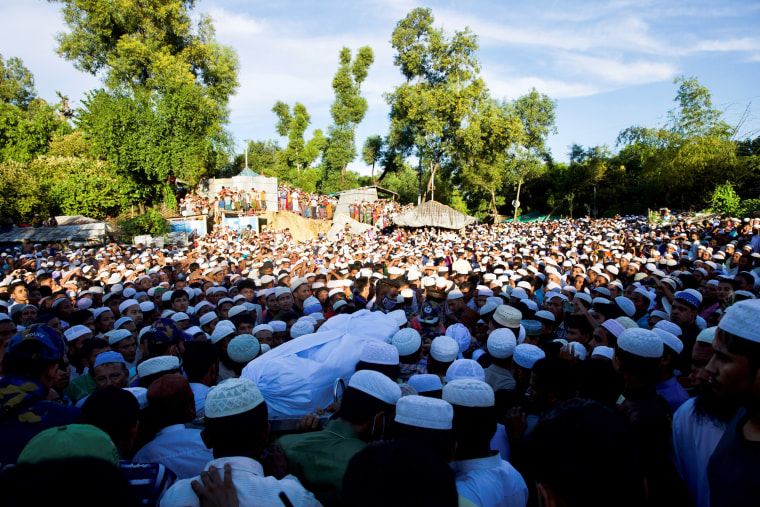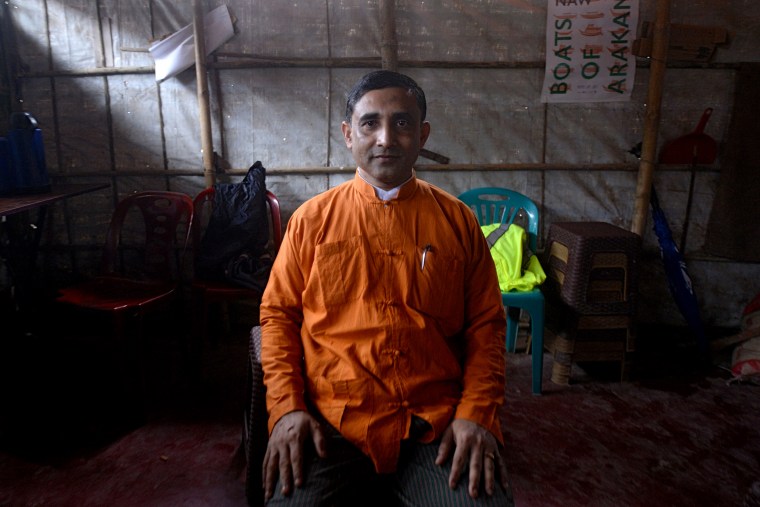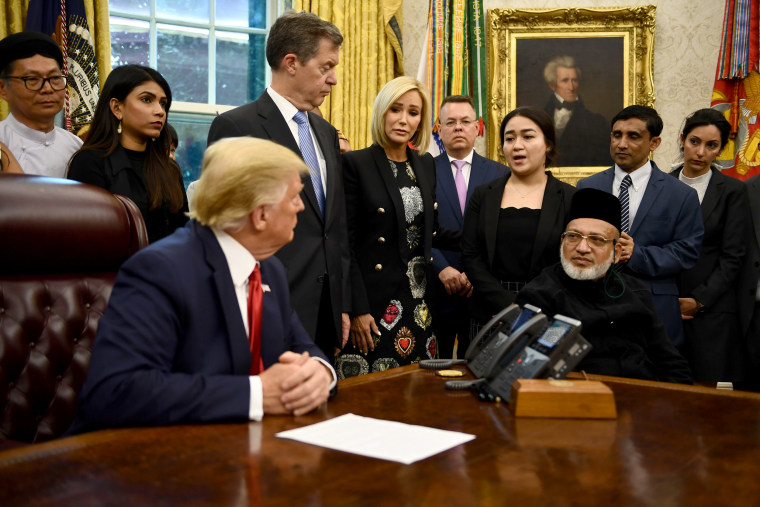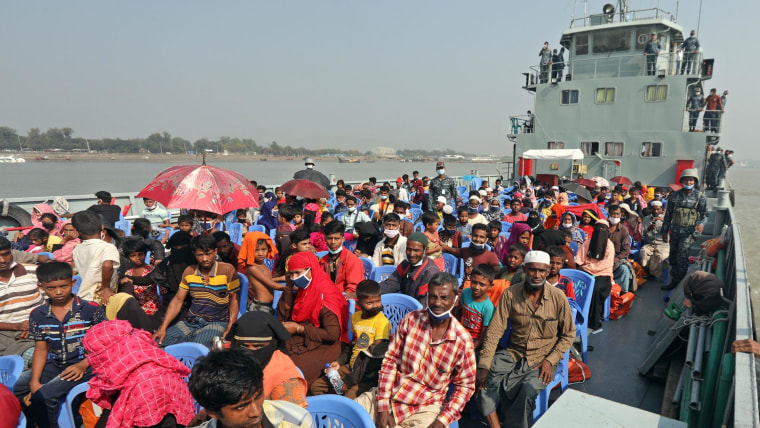Mohibullah had been an international advocate for Rohingya rights, including traveling to the White House for a meeting on religious freedom in 2019.

Bangladesh has been sheltering more than 1.1 million Rohingya refugees from Myanmar.
Mushfiqul Alam / Reuters
Oct. 1, 2021
By Jennifer Jett and Emanuel Stoakes
The United States and rights groups are calling for a full investigation after a prominent Rohingya Muslim leader was shot and killed at a refugee camp in Bangladesh.
Mohibullah, who was known by one name and was in his late 40s, was killed by unidentified gunmen on Wednesday in the Kutupalong camp in Cox's Bazar.
On Thursday evening, thousands of refugees attended his funeral prayers before Mohibullah was buried in a graveyard inside the camp.
The incident comes amid worsening violence at the sprawling settlement, which is home to hundreds of thousands of Rohingya refugees driven from neighboring Myanmar in 2017 by waves of state-sponsored violence.
Oct. 1, 2021
By Jennifer Jett and Emanuel Stoakes
The United States and rights groups are calling for a full investigation after a prominent Rohingya Muslim leader was shot and killed at a refugee camp in Bangladesh.
Mohibullah, who was known by one name and was in his late 40s, was killed by unidentified gunmen on Wednesday in the Kutupalong camp in Cox's Bazar.
On Thursday evening, thousands of refugees attended his funeral prayers before Mohibullah was buried in a graveyard inside the camp.
The incident comes amid worsening violence at the sprawling settlement, which is home to hundreds of thousands of Rohingya refugees driven from neighboring Myanmar in 2017 by waves of state-sponsored violence.
DEC. 4, 2020
Mohibullah had been an international advocate for Rohingya rights, including traveling to the White House for a meeting on religious freedom in 2019.
Secretary of State Antony Blinken said the U.S. was saddened by the murder and praised Mohibullah as a brave and fierce advocate for Rohingya rights.
“We urge a full and transparent investigation into his death with the goal of holding the perpetrators of this heinous crime accountable. We will honor his work by continuing to advocate for Rohingya and lift up the voices of members of the community in decisions about their future,” Blinken said in a statement Thursday.
Mohibullah had been an international advocate for Rohingya rights, including traveling to the White House for a meeting on religious freedom in 2019.
Secretary of State Antony Blinken said the U.S. was saddened by the murder and praised Mohibullah as a brave and fierce advocate for Rohingya rights.
“We urge a full and transparent investigation into his death with the goal of holding the perpetrators of this heinous crime accountable. We will honor his work by continuing to advocate for Rohingya and lift up the voices of members of the community in decisions about their future,” Blinken said in a statement Thursday.

Mohibullah was known as a voice for starting the repatriation of the refugees to Myanmar.
Manir Uz Zaman / AFP via Getty Images file
Mohibullah's death highlights the enduring struggles of the Rohingya, a Muslim minority group long persecuted by the Myanmar government, as they contend with not only displacement but threats to their safety within the camps, Human Rights Watch said.
“He always defended the rights of the Rohingya to safe and dignified returns and to have a say in the decisions concerning their lives and future,” Meenakshi Ganguly, the group's South Asia director, said in a statement.
“His killing is a stark demonstration of the risks faced by those in the camps who speak up for freedom and against violence.”
The U.N. refugee agency condemned the attack and said it was in contact with agencies responsible for the security of Rohingya refugees
"We urge the Bangladesh authorities to undertake an immediate investigation, and hold those responsible to account," it said.
As leader of the Arakan Rohingya Society for Peace and Human Rights, Mohibullah painstakingly documented the testimonials of survivors in the camps. The detailed record he provided has been cited in multiple investigations, including one by the International Criminal Court.
He addressed the U.N. Human Rights Council in 2019, and later that year he was part of a delegation of victims of religious persecution who met with former President Donald Trump at the White House.
Mohibullah's death highlights the enduring struggles of the Rohingya, a Muslim minority group long persecuted by the Myanmar government, as they contend with not only displacement but threats to their safety within the camps, Human Rights Watch said.
“He always defended the rights of the Rohingya to safe and dignified returns and to have a say in the decisions concerning their lives and future,” Meenakshi Ganguly, the group's South Asia director, said in a statement.
“His killing is a stark demonstration of the risks faced by those in the camps who speak up for freedom and against violence.”
The U.N. refugee agency condemned the attack and said it was in contact with agencies responsible for the security of Rohingya refugees
"We urge the Bangladesh authorities to undertake an immediate investigation, and hold those responsible to account," it said.
As leader of the Arakan Rohingya Society for Peace and Human Rights, Mohibullah painstakingly documented the testimonials of survivors in the camps. The detailed record he provided has been cited in multiple investigations, including one by the International Criminal Court.
He addressed the U.N. Human Rights Council in 2019, and later that year he was part of a delegation of victims of religious persecution who met with former President Donald Trump at the White House.

Mohibullah, a former teacher, had served as a spokesman representing the Muslim ethnic group in international meetings.
Brendan Smialowski / AFP via Getty Images file
In his remarks to the U.N. rights council, Mohibullah said the Rohingya had faced "systematic genocide" in Myanmar, where the government denies them citizenship.
"Imagine you have no identity, no ethnicity, no country, nobody wants you," he said. "How would you feel? This is how we feel today as Rohingya."
He said the Rohingya wanted to return home if they could be guaranteed citizenship and security.
"We are not stateless. Stop calling us that," he said. "We have a state, it is Myanmar."
But as Mohibullah's international profile increased, so did the number of death threats.
“Everyone in governments around the world who facilitated his travel overseas was well aware of the death threats he received, over the last 12 months in particular,” Eva Buzo, Mohibullah's lawyer, said in a phone interview with NBC News.
Saad Hammadi, South Asia campaigner for Amnesty International, said Mohibullah's killing "sends a chilling effect across the entire community."
The rights group said that since last year, at least 2,000 Rohingya refugees had been forced to flee their shelters by violence between two factions vying for control of the camp's illicit drug trade.
In his remarks to the U.N. rights council, Mohibullah said the Rohingya had faced "systematic genocide" in Myanmar, where the government denies them citizenship.
"Imagine you have no identity, no ethnicity, no country, nobody wants you," he said. "How would you feel? This is how we feel today as Rohingya."
He said the Rohingya wanted to return home if they could be guaranteed citizenship and security.
"We are not stateless. Stop calling us that," he said. "We have a state, it is Myanmar."
But as Mohibullah's international profile increased, so did the number of death threats.
“Everyone in governments around the world who facilitated his travel overseas was well aware of the death threats he received, over the last 12 months in particular,” Eva Buzo, Mohibullah's lawyer, said in a phone interview with NBC News.
Saad Hammadi, South Asia campaigner for Amnesty International, said Mohibullah's killing "sends a chilling effect across the entire community."
The rights group said that since last year, at least 2,000 Rohingya refugees had been forced to flee their shelters by violence between two factions vying for control of the camp's illicit drug trade.
Bangladesh pledges 'justice' for murdered Rohingya activist
The country said that "no-one will be spared" in the hunt to find Mohib Ullah's killers. The police have made a number of arrests tied to the murder

Mohib Ullah was killed by unknown gunmen in Kutupalong refugee camp
Bangladesh on Saturday promised to mete out justice to the killers of a prominent Rohingya rights activist.
Mohib Ullah, the head of the Arakan Rohingya Society for Peace and Human Rights (ARSPH), was killed by unknown gunmen in the Kutupalong refugee camp, in the southeastern Bangladeshi district of Cox's Bazar, on Wednesday night.
The police made three arrests on Friday in connection with the killing but provided no further details.
Over 700,000 Rohingya fled their home country Myanmar to Bangladesh, following a brutal crackdown by the military in 2017.
What has Bangladesh promised?
"The government will take stern action against those who were involved in the killing. No one will be spared," Foreign Minister A.K. Abdul Momen said in his first comment since the killing.
Momen added that "vested" interests were responsible for the killing as Mohib Ullah had wanted to return to Myanmar. "The killers of Mohib Ullah must be brought to justice," he said.
Are there any suspects?
The three people arrested on Friday are believed to have links to an armed insurgent group among Rohingya refugees.
They are currently being interrogated, Naimul Huq, a police official in Cox's Bazar, said.
In an unverified video circulated on social media, Mohib Ullah's brother, Habib Ullah, who said he witnessed the shooting, blamed the Arakan Rohingya Salvation Army (ARSA), an armed group active in the camps.
ARSA said in a post on Twitter on Friday that it was "shocked and saddened" by the killing and decried "finger-pointing with baseless and hearsay accusations."
Who was Mohib Ullah?
Mohib Ullah was known as a moderate who advocated for the Rohingya to return to Myanmar with rights they were denied during decades of persecution.
He founded the Arakan Rohingya Society for Peace and Human Rights in a bid to document atrocities against Rohingya in their native Myanmar and give them a voice in international talks about their future.
But his high profile made him a target of hardliners and he received death threats.
The killing has ignited grief and anger in the camps that make up the world's largest refugee settlement.
The country said that "no-one will be spared" in the hunt to find Mohib Ullah's killers. The police have made a number of arrests tied to the murder

Mohib Ullah was killed by unknown gunmen in Kutupalong refugee camp
Bangladesh on Saturday promised to mete out justice to the killers of a prominent Rohingya rights activist.
Mohib Ullah, the head of the Arakan Rohingya Society for Peace and Human Rights (ARSPH), was killed by unknown gunmen in the Kutupalong refugee camp, in the southeastern Bangladeshi district of Cox's Bazar, on Wednesday night.
The police made three arrests on Friday in connection with the killing but provided no further details.
Over 700,000 Rohingya fled their home country Myanmar to Bangladesh, following a brutal crackdown by the military in 2017.
What has Bangladesh promised?
"The government will take stern action against those who were involved in the killing. No one will be spared," Foreign Minister A.K. Abdul Momen said in his first comment since the killing.
Momen added that "vested" interests were responsible for the killing as Mohib Ullah had wanted to return to Myanmar. "The killers of Mohib Ullah must be brought to justice," he said.
Are there any suspects?
The three people arrested on Friday are believed to have links to an armed insurgent group among Rohingya refugees.
They are currently being interrogated, Naimul Huq, a police official in Cox's Bazar, said.
In an unverified video circulated on social media, Mohib Ullah's brother, Habib Ullah, who said he witnessed the shooting, blamed the Arakan Rohingya Salvation Army (ARSA), an armed group active in the camps.
ARSA said in a post on Twitter on Friday that it was "shocked and saddened" by the killing and decried "finger-pointing with baseless and hearsay accusations."
Who was Mohib Ullah?
Mohib Ullah was known as a moderate who advocated for the Rohingya to return to Myanmar with rights they were denied during decades of persecution.
He founded the Arakan Rohingya Society for Peace and Human Rights in a bid to document atrocities against Rohingya in their native Myanmar and give them a voice in international talks about their future.
But his high profile made him a target of hardliners and he received death threats.
The killing has ignited grief and anger in the camps that make up the world's largest refugee settlement.

No comments:
Post a Comment